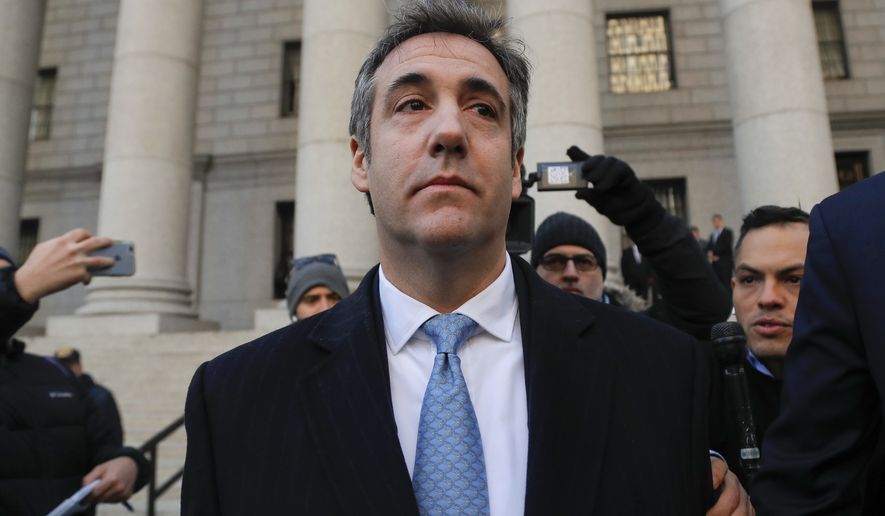President Trump’s longtime “fixer” Michael Cohen pleaded guilty Thursday to charges of lying to Congress and now says the president’s business empire was pursuing a deal with Russia even during the heart of the 2016 presidential campaign as that country was trying to interfere in the election.
In a deal with special counsel Robert Mueller, Cohen admitted he misled lawmakers last year when he told them his attempts on behalf of the Trump Organization to build a Trump Tower in Russia ended in January 2016 and that he never talked about having Mr. Trump travel to Moscow.
In court documents filed Thursday, though, Cohen said his efforts on what was known as the “Moscow project” lasted at least until June 2016, he planned a Moscow trip for himself and was working on one for Mr. Trump for later that year, possibly after Mr. Trump claimed the Republican presidential nomination at the party’s national convention.
Cohen’s new version of events would show Mr. Trump actively pursuing a business deal with Russia during an election in which Moscow has been accused of unprecedented meddling.
“I made these statements to be consistent with Individual-1’s political messaging and to be loyal to Individual-1,” Cohen said in court. Based on comparing his previous public statements to the court documents, it’s clear “Individual 1” is Mr. Trump.
Speaking to reporters after the plea, Mr. Trump called Cohen “a weak person and not a very smart person.”
DOCUMENT: Read the court documents tying Michael Cohen to Russia
The president said he canceled the Russia project, but even if it had gone forward, it would have been legal to run a business while campaigning for president.
“What he’s trying to do is get a reduced sentence, so he’s lying about a project that everybody knew about,” Mr. Trump said.
Democrats said the guilty plea tightened the net around Mr. Trump, whose personal attorney, campaign chairman and national security adviser all have pleaded guilty to charges brought by Mr. Mueller.
Cohen, who pleaded guilty in a federal courtroom in Manhattan, agreed with federal prosecutors’ statements that he had a 20-minute conversation with a spokesman for the Kremlin about Trump business. As late as June 2016, Cohen discussed the project with a Russian-born businessman, Felix Sater, identified as “individual-2” in court documents. The two communicated extensively about plans for Cohen’s trip to Russia, which never came to fruition.
The plea deal is Cohen’s second in two months. In August, he pleaded guilty in the Southern District of New York to making illegal campaign contributions by paying hush money to porn actress Stormy Daniels and Playboy centerfold Karen McDougal.
Both women have said they had affairs with Mr. Trump, which the president denies, though he has acknowledged the payments were made.
Cohen, who once declared that he would “take a bullet” for Mr. Trump, has been cooperating with the Mueller investigation.
He has reportedly spent more than 70 hours with prosecutors answering questions about contacts between Russia and Trump campaign officials during the presidential campaign. Cohen also has spoken to Mr. Mueller’s team about Mr. Trump’s business ties to Russia and possible pardons, ABC News reported.
Cohen served as Mr. Trump’s personal fixer for more than a decade, working with the real estate mogul-turned-president on highly sensitive personal and business matters.
Solomon Wisenberg, a Washington lawyer who served as independent counsel Kenneth W. Starr’s deputy during investigations into President Bill Clinton, said he doesn’t view the details disclosed Thursday as particularly dangerous to Mr. Trump.
“In terms of criminal liability, the special counsel would have to show that Trump knew of and approved Cohen writing a false letter to Congress,” he said.
Mr. Wisenberg said a presidential candidate conducting business with a foreign government may be good fodder for pundits but is not illegal. It is likely not going to be a political liability for the president, he said, noting that Mr. Trump this week did not dismiss the idea of pardoning his now-convicted former campaign chairman, Paul Manafort.
“Add this to the list of stuff that would be devastating, historically, to any other candidate but doesn’t seem to affect Trump,” he said.
Jacob S. Frenkel, a former federal prosecutor in New Orleans and now a Washington white-collar defense lawyer, said Mr. Mueller’s team may know much more than what is contained in the Cohen deal.
“I think to suggest that a narrow plea agreement means that is all that occurred gives a false sense of security or interpretation,” he said. “By its very nature, a plea deal reflects a set of parameters in this type of an investigation that enables the prosecutor to add another puzzle piece to the story yet still keep substantive evidence close to the vest.”
Mr. Frenkel said Mr. Trump’s defense of running of his business while a presidential candidate may be good public relations but doesn’t amount to much of a legal argument if it comes to that.
As Cohen’s cooperation with the special counsel moves forward, analysts said they could see Mr. Trump’s legal team reviving its argument that his dealings with his longtime attorney are privileged.
• Gabriella Munoz contributed to this report.
• Dave Boyer can be reached at dboyer@washingtontimes.com.
• Jeff Mordock can be reached at jmordock@washingtontimes.com.




Please read our comment policy before commenting.